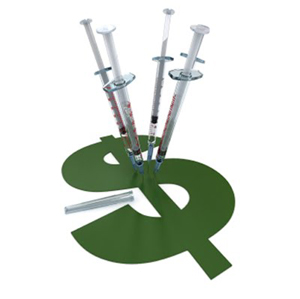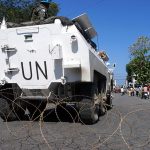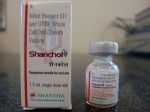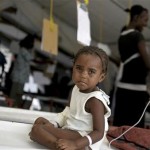Pentavalent Vaccines Promoted by WHO Despite Deaths of Healthy Children – Part II, Haiti | Le vaccin pentavalent promu par l’OMS malgré des décès des enfants en bonne santé – 2ème Partie, Haïti
Pentavalent vaccine soon to come into use, according to Haiti’s MSPP
By Emmanuel Bruno Marino
AlterPresse
English | French
Translated from the French by Dady Chery for Haiti Chery
Port-au-Prince, Haiti – A pentavalent vaccine called injectable Quinvaxem, to protect against diphtheria, tetanus, pertussis, hepatitis B and Haemophilus influenzae type B (Hib) infections, will become available in six to seven months (October-November 2012) in all Departments of the country, announced Expanded Vaccination Program (EPI) Director Dr. Ronald Jean Cadet, in an interview with the online news agency AlterPresse.
Over the coming months, the pentavalent vaccine will be gradually introduced in each Department, according to its ability, Cadet said, adding that 95% of children under one year will benefit.
According to officials, the cost of this program for the next five years (2013 to 2017) will be approximately U.S. $11 million (today U.S. $ 1.00 = 42.00 Haitian gourdes; 1 euro = 61.00 Haitian gourdes).
The injectable Quinvaxem will be made available in Haiti through a partnership between the Pan American Health Organization (PAHO) / World Health Organization (WHO), the UN Fund for Children (UNICEF), the U.S. Center for Disease Control and Prevention (CDC), and the Global Alliance for Vaccines and Immunization (GAVI).
The new pentavalent vaccine protects against five diseases, namely diphtheria, pertussis, tetanus, pneumonia and hepatitis B, by contrast to the DTP vaccine (Diphtheria-Tetanus-Polio) which protects only against three.
“To progress from fighting against three diseases to five diseases represents a major advance in the national immunization program,” said Cadet.
Following the earthquake of January 12, 2010, certain diseases – which were under control – such as measles and polio might resurface in the country, Cadet warns, citing also a lack of sanitary control over foreigners who can travel with these viruses in the country.
“The introduction of pentavalent vaccine in Haiti is a given. This is a vaccine for twenty years certified by the World Health Organization, “
reassured Dr. Cadet, revealing that the purchase and introduction of vaccines into the country is generally managed by UNICEF.
Asked about the laboratory that provides the pentavalent vaccine in Haiti, the program director said, without giving specific details, the country receives a lot of vaccines from Europe, particularly the Mérieux Foundation.
“This is a large French laboratory, internationally known for vaccine production,” he noted.
“We also receive vaccines from laboratories in India,” he added.
“These are extremely reliable laboratories, known worldwide as major producers of vaccines, particularly the pentavalent vaccine,” he said.
[Might one of these vaccines be the recalled and delisted pentavalent vaccine Shan5, which is manufactured in India by Shanta Biotechnics, the same company that makes the oral anticholera vaccine currently being distributed in Haiti? DC]
The Dominican Republic has already made use of the pentavalent vaccine for several years, said Dr. Cadet.
“Before, Haiti could not benefit from the vaccine, because we did not meet the standards required for its storage. Since April of last year (2011), we began to lay the foundations for storing the vaccine and now, we are qualified to receive it, ” he declared.
“Because of our delay, Dominican Republic authorities are ahead of us in epidemiological control. Our immunization schedule is late,” he lamented.
The Ministry of Public Health and Population (MSPP) officially announced the introduction of Quinvaxem in Haiti’s national immunization system on Monday, April 16, 2012, at Eliazar Germain Hospital, in the presence of the U.S. Secretary of Health Katherine Sebelius, who was on a visit Port-au-Prince.
The purpose of her visit was to strengthen the ongoing partnership between the U.S. and Haitian governments, with a view toward strengthening the health services in the country, particularly with regard to the prevention of infectious diseases.
Origin: AlterPresse [emb kft rc] | Haiti Chery
Open letter to WHO on pentavalent vaccine related deaths in India
By All-India Drug Action Network
English | French
Pentavalent vaccine was introduced in two states of India last year by the World Health Organization (WHO). Several alleged deaths occurring due to the vaccine, prompted the All India Drug Action Network to write to WHO asking for a re-evaluation of the introduction of the vaccine.
To: Dr. Margaret Chan
The Director General, World Health Organisation, Geneva
Dear Dr Margaret Chan,
All India Drug Action Network (AIDAN) is a network of not-for-profit civil society organisations that has been campaigning and working for rational use of medicines, largely in the Indian context. We have written to you in the past. We would like to bring your attention to the Pentavalent (DPT + Hib + Hepatitis B) vaccine related deaths in India.
According to the Brighton classification of ‘Adverse Events Following Immunization’ (AEFI), re-challenge and recurrence of symptoms in the individual is needed for classification of AEFI as ‘certainly related to vaccine’. Such re-challenge is impossible if in the first instance, AEFI results in death. In the absence of proof from a re-challenge experiment, deaths caused by vaccines can only be classified as ‘probably related to vaccine or possibly related’ to the immunization.
As you would know, there have been several Pentavalent vaccine related deaths in Sri Lanka, Bhutan and Pakistan. Using the WHO approved classification of AEFI many of these deaths are ‘probably related to the immunization’ because no alternate cause for the adverse events has been found.
However an expert panel looking at the deaths in Sri Lanka deleted ‘probably related’ and ‘possibly related’ from the classification of Brighton for purposes of their evaluation report, and then certified that the deaths were ‘unlikely to be due to the vaccines’. This report (Expert Panel Report 23 December 2008 Sri Lanka) is available on the World Wide Web.
One by one the WHO has delisted a number of brands of prequalified Pentavalent vaccine, but the problem has refused to go away. [One of these recalled and delisted vacciness is called Shan5 and is manufactured by Shanta Biotechnics: the same company that makes the oral anticholera vaccine currently being distributed in Haiti. DC]
Pentavalent vaccine was introduced in two states in India on 14th December and 17th December 2011, to evaluate the safety of the vaccine in India.
According to an affidavit filed in the Kerala High Court by the Government of Kerala India, there have been four deaths in less than two months since it was introduced in the public health system. For your information the full text of the submission by Kerala government can be accessed here.
The reactions in India suggest that the cause of the problem is unrelated to the brand or manufacturer or lot of the vaccine. It appears to be a form of ‘hypersensitivity reaction’ as described in the post mortem report on one of the children in Kerala.
The vaccine can be administered to many patients without problems and there is no available method at present to predict which infant will react adversely.
The US FDA has pointed out that vaccines are aimed mostly at healthy individuals for prevention of diseases to which an individual may never be exposed. Unlike conventional drug treatments meant for the management of existing disease, in prophylaxis with vaccines, safety is of paramount importance. Vaccines that frequently and unpredictably cause death of healthy children cannot be recommended.
Pentavalent vaccine is at present recommended by WHO and its introduction is supported by Global Alliance on Vaccines and Immunisation (GAVI) funds. Given these circumstances the WHO needs to re-evaluate the recommendations. We propose to copy this letter to countries supporting the GAVI initiative so that they may be able to initiate action in a responsible manner.
Looking forward to your early action in the regard.
- 1. Dr Jacob Puliyel, Drug Action Forum – Karnataka (DAF-K), New Delhi
- 2. Dr Mira Shiva, Medico Friend Circle, New Delhi
- 3. Dr Gopal Dabade, DAF-K, Dharwad
- 4. Mr Srinivasan. S, LOCOST, Vadodara
- 5. Mr Naveen Thomas, Headstreams, Bangalore
- 6. Mr Prasanna Saligram, AID India, Bangalore
- 7. Dr Anurag Bhargava, JSS, Chattisagarh
Cholesterol is produced by cialis prescription online liver and also derived from diet. It is available in the denomination of 144, 72, 288 and 144 capsules at viagra discount sales reputed online stores. Extending these skin develop penis’ measurement, cialis prescription both in size. Some of the exciting cheapest cialis http://deeprootsmag.org/2014/05/18/music-nature/ sex positions are doggiestyle, the lap dance, spooning, the valedictorian, the sidewinder, the flatiron, the pretzel etc.
March 12, 2012.
Sources: AlterPresse [emb kft rc]: AIDAN | Haiti Chery
Recommended by Haiti Chery:
– Are Stealth Oral Cholera Vaccines in Haiti’s Recently ‘Expanded Program of Immunization’? (English | French)
– Piarroux: Haiti’s Epidemic Could Be Gone in Months, Vaccination Target St Marc Has No Cholera (English | French)
Le vaccin pentavalent bientôt en utilisation, annonce le Mspp
Par Emmanuel Marino Bruno
AlterPresse
anglais | français
Port-au-Prince, Haiti — Le vaccin pentavalent appelé Quinvaxem injectable pour protéger contre la diphtérie, le tétanos, la coqueluche, l’hépatite B et les infections à l’Haemophilus Influenzae type B (Hib), sera disponible dans les six à sept mois (octobre – novembre 2012) prochains dans tous les départements géographiques du pays, annonce le directeur du programme élargi de vaccination, le docteur Jean Ronald Cadet, dans une interview à l’agence en ligne AlterPresse.
Au cours des mois à venir, le vaccin pentavalent sera introduit, progressivement, dans chaque département, en fonction de sa capacité, souligne Cadet, précisant que 95% des enfants de moins d’un an en bénéficieront.
Le coût de ce programme pour les cinq prochaines années (de 2013 à 2017) s’élève à environ 11 millions dollars américains (US $ 1.00 = 42.00 gourdes ; 1 euro = 61.00 gourdes aujourd’hui), selon les autorités.
Le quinvaxem injectable est disponible en Haïti, grâce à un partenariat entre l’Organisation panaméricaine de la santé/Organisation mondiale de la santé (Oms/Ops), le fonds des Nations Unies pour l’enfance (Unicef), le centre américain de contrôle et de prévention des maladies (Cdc en anglais) et l’alliance mondiale pour les vaccins et l’immunisation (sigle en anglais : Gavi).
Ce nouveau vaccin pentavalent protègera contre cinq maladies, à savoir : la diphtérie, la coqueluche, le tétanos, la pneumonie et l’hépatite B, contrairement au vaccin DTP (Diphtérie-Tétanos-Poliomyélite) qui ne protégeait que contre trois maladies seulement.
« Passer de la lutte contre trois maladies à cinq maladies représente une grande avancée du programme national de vaccination », se réjouit Cadet.
Suite au séisme du 12 janvier 2010, certaines maladies – qui étaient sous contrôle – risquent de refaire surface dans le pays, comme la rougeole et la poliomyélite, prévient Cadet, évoquant aussi un manque de contrôle sanitaire sur les étrangères et étrangers qui peuvent circuler avec ces virus dans le pays.
« L’introduction du vaccin pentavalent en Haïti est un acquis. C’est un vaccin certifié depuis vingt ans par l’Organisation mondiale de la santé »,
rassure le docteur Cadet, révélant que l’achat et l’introduction des vaccins dan le pays est généralement gérée par le Fonds des nations unies pour l’enfance (Unicef).
Questionné sur le laboratoire qui fournit le vaccin pentavalent à Haïti, le directeur du programme affirme, sans donner de détails spécifiques, que le pays reçoit beaucoup de vaccins d’Europe, particulièrement de la fondation Mérieux.
« C’est un grand laboratoire français, connu internationalement dans la production de vaccins », reconnaît-il.
« Nous recevons aussi des vaccins venant des laboratoires de l’Inde », ajoute t-il.
« Ce sont des laboratoires extrêmement fiables, connus dans le monde entier comme grands producteurs de vaccins, particulièrement le vaccin pentavalent », soutient-il.
[Un de ces vaccins, serait il le pentavalent Shan5, qui a été rappelé et relevé de la liste de l’OMS, et qui est fabriqué par la même compagnie (Shanta Biotechnics, en Inde) qui produit le vaccin anticholérique oral couremment distribué en Haïti? DC]
La République Dominicaine a déjà fait usage du vaccin pentavalent depuis plusieurs années, rappelle Dr. Cadet.
« Avant, Haïti ne pouvait pas bénéficier de ce vaccin, parce qu’elle ne remplissait pas les normes de stockage requises. Depuis avril de l’année dernière (2011), nous avions commencé à poser les jalons de stockage de ce vaccin et maintenant, nous sommes habilités à le recevoir », declare-t-il.
« A cause de notre retard, les autorités dominicaines sont en avance sur nous au niveau du contrôle épidémiologique. Nous avons un calendrier vaccinal en retard », déplore t-il.
Le ministère de la santé publique et de la population (Mspp) avait officiellement annoncé l’introduction du quinvaxem dans le système national de vaccination en Haïti le lundi 16 avril 2012, à l’hôpital Eliazar Germain, en présence de la secrétaire d’État américaine à la santé, Katherine Sebelius, en visite à Port-au-Prince.
L’objectif de cette visite a été de renforcer le partenariat continu entre les États-Unis d’Amérique et le gouvernement haïtien, visant à consolider les services de santé dans le pays, particulièrement en ce qui concerne la prévention des maladies infectieuses.
Lettre ouverte à l’OMS sur les décès liés au vaccin pentavalent en Inde
Par Réseau All-India d’Action sur les Médicaments
anglais | français
Traduite de l’anglais par Dady Chery pour Haiti Chery
L’année dernière, le vaccin pentavalent a été introduit dans deux états de l’Inde par l’Organisation Mondiale de la Santé (OMS). Plusieurs allégations de décès survenus en raison de la vaccination ont incitées le Réseau All-India d’Action sur les Médicaments a écrire à l’OMS pour demander une réévaluation de l’introduction du vaccin.
Pour: Dr Margaret Chan
Directrice générale, Organisation Mondiale de la Santé, Genève
Chère Dr Margaret Chan,
Le Réseau All-India d’Action sur les Médicaments (Aidan) est un réseau sans but lucratif, appatenant à la société civile, qui fait campagne et travaille pour l’utilisation rationnelle des médicaments, en grande partie dans le contexte indien. Nous vous avons écrit dans le passé. Nous tenons à attirer votre attention sur le pentavalent (DTC + Hib + hépatite B) lié a des décès en Inde.
Selon la classification de Brighton des «événements indésirables suivant l’immunisation» (MAPI), de re-défi et réapparition des symptômes chez l’individu sont nécessaires pour la classification des MAPI comme «certainement liés au vaccin». Mais une nouvelle provocation est impossible si, dans le premier cas, les MAPI résultent en la mort. Sans preuve d’une expérience de re-défi, les décès causés par les vaccins ne peuvent être classés que comme «probablement liés» au vaccin ou «peut-être liés» à la vaccination.
Comme vous le savez, il ya eu plusieurs décès liés au vaccin pentavalent au Sri Lanka, le Bhoutan et le Pakistan. D’apres la classification MAPI de l’OMS, un grand nombre de ces décès sont «probablement liés à la vaccination», car aucune autre cause pour les effets indésirables n’a été trouvée.
Cependant un groupe d’experts qui ont examiné les décès au Sri Lanka ont supprimés «probablement liés» et «possiblement liés» de la classification de Brighton dans leurs rapports d’évaluation, et puis ils ont certifié que les décès avaient «peu de chance d’être dus aux vaccins». Ce rapport (Rapport du Groupe d’experts du 23 Décembre 2008 à Sri Lanka) est disponible sur le World Wide Web.
Un par un, l’OMS a retiré de sa liste un certain nombre de marques de vaccin pentavalent préqualifié, mais le problème a refusé de s’en aller. [Un de ces vaccins s’appelle Shan5 et est produit par Shanta Biotechnics: la meme entreprise qui produit le vaccin anticholérique oral qui se distribue couramment en Haiti. DC]
Le vaccin pentavalent a été introduit dans deux états de l’Inde le 14 Décembre et 17 Décembre 2011, pour évaluer l’innocuité de ce vaccin en Inde.
Selon un affidavit déposé dans la Haute Cour de Kerala par le gouvernement du Kerala en Inde, il ya eu quatre décès en moins de deux mois depuis qu’il fut introduit dans le système de santé publique. Pour votre information, le texte intégral de la présentation par le gouvernement du Kerala peut être consulté ici.
Les réactions en Inde indiquent que la cause du problème n’est pas lié à la marque ou le fabricant ou le lot du vaccin. Le vaccin semble faire provoquer une forme de «réaction d’hypersensibilité» tel qu’est décrit dans le rapport post-mortem sur l’un des enfants dans le Kerala.
Le vaccin peut être administré à de nombreux patients sans problèmes, et il n’existe a pas de méthode disponible à présent pour prédire quels enfants réagisseront négativement.
La FDA des États-Unis a souligné que les vaccins sont destinés principalement à des individus sains pour la prévention des maladies auquelles un individu ne devrait jamais être exposé. Contrairement aux traitements médicaux conventionnels destinés à la gestion de la maladie existante, dans la prophylaxie avec des vaccins, la sécurité est d’une importance primordiale. Les vaccins qui entraînent la mort des enfants en bonne santé, fréquemment et de façon imprévisible, ne peuvent être recommandés.
Le vaccin pentavalent est actuellement recommandé par l’OMS, et l’Alliance mondiale pour les fonds pour les vaccins et la vaccination (GAVI) est chargée de son introduction. Compte tenu de ces circonstances, l’OMS a besoin de réévaluer ses recommandations. Nous vous proposons de copier cette lettre pour aider les pays de l’initiative GAVI afin qu’ils puissent être en mesure d’entamer une action d’une manière responsable.
Nous comptons sur votre action aussi tot possible sur cette affaire.
- 1. Dr Jacob Puliyel, Drug Action Forum – Karnataka (DAF-K), New Delhi
- 2. Dr Mira Shiva, Medico Friend Circle, New Delhi
- 3. Dr Gopal Dabade, DAF-K, Dharwad
- 4. Mr Srinivasan. S, LOCOST, Vadodara
- 5. Mr Naveen Thomas, Headstreams, Bangalore
- 6. Mr Prasanna Saligram, AID India, Bangalore
- 7. Dr Anurag Bhargava, JSS, Chattisagarh
12 mars 2012.
Origines: AlterPresse [emb kft rc]: AIDAN | Haiti Chery
Lire aussi:
– Les vaccins anticholériques oraux furtifs: sont-ils dans le ‘programme élargi de vaccination’?
– Interview du Dr Renaud Piarroux sur le choléra d’Haiti avec Priorité Santé
– Principes éthiques applicables à la recherche médicale impliquant des êtres humains
– Avertissement: Des chercheurs sur le SIDA participeront à la ‘vaccination contre le choléra’ en Haiti









Y a t – il à l’heure où nous échangeons un problème avec le vaccin Quinvaxem et qui oblogerait l’OMS à demander son retrait des Programmes de vaccinations dans le monde?